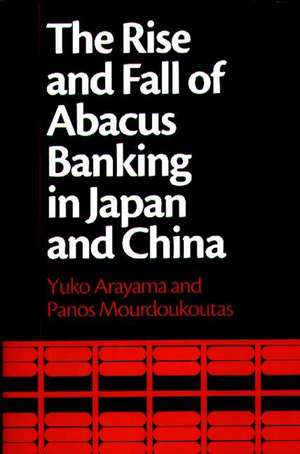The Rise and Fall of Abacus Banking in Japan and China
Autor Yuko Arayama, Panos Mourdoukoutasen Limba Engleză Hardback – 29 mai 2000 – vârsta până la 17 ani
Preț: 438.07 lei
Preț vechi: 604.38 lei
-28% Nou
Puncte Express: 657
Preț estimativ în valută:
83.83€ • 91.03$ • 70.42£
83.83€ • 91.03$ • 70.42£
Carte tipărită la comandă
Livrare economică 22 aprilie-06 mai
Preluare comenzi: 021 569.72.76
Specificații
ISBN-13: 9781567203240
ISBN-10: 1567203248
Pagini: 208
Dimensiuni: 156 x 235 x 24 mm
Greutate: 0.54 kg
Editura: Bloomsbury Publishing
Colecția Praeger
Locul publicării:New York, United States
ISBN-10: 1567203248
Pagini: 208
Dimensiuni: 156 x 235 x 24 mm
Greutate: 0.54 kg
Editura: Bloomsbury Publishing
Colecția Praeger
Locul publicării:New York, United States
Notă biografică
YUKO ARAYAMA teaches and conducts research in economic theory and applied economics at Nagoya University, Japan. He also serves as Director of the Contemporary Japanese Economic Research Program at Beijing University. He publishes widely in the professional journals. Dr. Arayama is coauthor (with Panos Mourdoukoutas) of China Against Herself (Quorum, 1999).PANOS MOURDOUKOUTAS is Professor of Economics, Long Island University, New York. He has traveled extensively throughout Asia and Europe as an advisor to government and business organizations, with extended stays at Nagoya University. Among his many publications are China Against Herself (with coauthor Yuko Arayama), (1999), The Global Corporation (1999), and Collective Entrepreneurship in a Globalizing Economy (1999), all published by Quorum Books.
Cuprins
Beyond Nonperforming Assets: Abacus BankingThe Rise and Fall of Abacus Banking and the Banking Crisis in JapanThe Rise of Abacus Banking in JapanThe Fall of Abacus Banking in JapanThe Banking CrisisThe Rise and Fall of Abacus Banking and the Looming Banking Crisis in ChinaThe Rise of Abacus Banking in ChinaThe Fall of Abacus Banking in ChinaThe Looming Banking Crisis in ChinaConclusions
